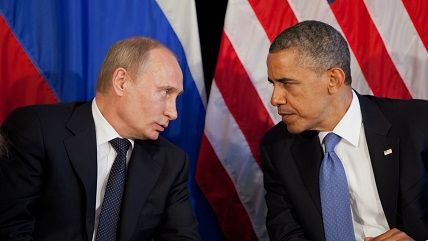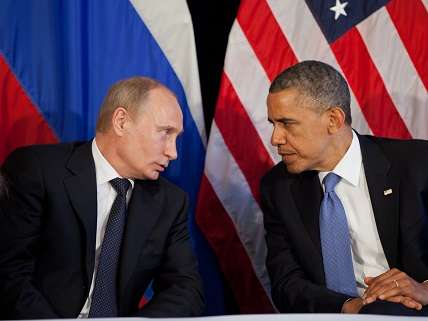Obama Notes Stances on Russia Depend on 'What's Politically Expedient'—Not Talking About Himself
Bemoaning shift on Russia by Republicans, but not his own or that of fellow-travelers.


With just 35 days left in office, President Barack Obama says he's vowing to do something about alleged Russian interference in the U.S. presidential elections. What that something is (perhaps more sanctions, perhaps more U.S. support for democracy groups in Russia) remains to be seen.
Whatever the president decides to do, it's unlikely to include Congress, which is controlled by Republicans who would mostly prefer to wait for Donald Trump to get into office before doing anything on anything. Additionally, it appears that the intelligence community that purportedly decided Russia was attempting to interfere in the elections is not that interested, at this moment, to talk about that except through anonymous sources to the Washington Post and other outlets. A Congressional hearing scheduled for yesterday on the issue was cancelled after the CIA declined to show up. According to the anonymous sources, all 17 U.S. intelligence agencies are in agreement on the secret report. What the role of agencies like Coast Guard Intelligence could be is still unclear.
"All we've heard from the intelligence community over the last several months is that they could not say that there was any attempt to undermine Hillary Clinton, to help Donald Trump," King said on Fox News. "The consensus was that there was an attempt by the Russians to put a cloud over the election, to create disunity. Well, that's what's happening right now, but it's the intelligence community that's doing it."
For his part, Obama in an interview on NPR this morning complained about the inconsistency of political positions in regards to Russia, and specifically Republicans. "The irony of all this, of course, is that for most of my presidency, there's been a pretty sizable wing of the Republican Party that has consistently criticized me for not being tough enough on Russia," Obama said. "Some of those folks during the campaign endorsed Donald Trump, despite the fact that a central tenet of his foreign policy was we shouldn't be so tough on Russia. And that kind of inconsistency, I think, makes it appear, at least, that their particular position on Russia on any given day depends on what's politically expedient."
But what does that say about President Obama and the Obama administration's positions on Russia? Four years ago, when Republican presidential nominee Mitt Romney called Russia the U.S.'s number one geopolitical foe, Obama and company, and the same media now helping push Russophobia, mocked him. "His comments display either a shocking lack of knowledge about international affairs or just craven politics," The New York Times insisted. "Either way, they are reckless and unworthy of a major presidential contender." Trump's more mellow approach to Russia is also, apparently, unworthy—it's hard to imagine any Republican making any kind of comment on Russia the Times would not find unworthy.
At the Democratic National Convention in 2012, meanwhile, then-Senator and now Secretary of State John Kerry, also laid into Romney for looking at Russia as a geopolitical foe, calling it a "preposterous" idea. "Sarah Palin said she could see Russia from Alaska," Kerry quipped. "Mitt Romney talks like he's only seen Russia by watching Rocky IV." The Democrats even sold the quote on a poster. By 2014, Kerry was resorting to telling Russia they weren't in the Cold War-era movie Rocky IV.
The problem for Obama is his protestation about the inconsistency of Republicans' Russia position will come off as politically expedient itself so long as he refuses to address his own inconsistencies, and how he and Kerry and others got to their 2016 position on Russia from their 2012 position.
Throughout the campaign, Democratic presidential nominee Hillary Clinton promised a more aggressive approach to Russia than the Obama administration had ever took. At one debate, she even admitted she was interested in imposing a no-fly zone over Syria in order to gain leverage over Russia and force the country to the negotiating table. She had previously acknowledged such actions would cost civilian lives. All this without ever once articulating a specific, substantive, national security purpose for U.S. intervention in Syria.
Obama understood Americans' war-weariness in 2012. So he took credit for ending the war in Iraq when he had tried to expand it, and framed Afghanistan as a war that was ending even though it will now continue past his presidency. These were politically expedient lies to tell to an American population not all that interested in war. Clinton disposed of even the pretense of being a skeptic about war, effectively promising more of it when she won. It's unsurprising she lost, and a frightening revealed preference that she refused to tone down her interventionist rhetoric on wars of choice or take responsibility for past interventionist mistakes even as she insisted Trump posed a unique threat to democracy.
